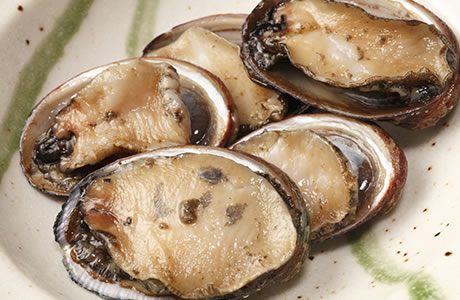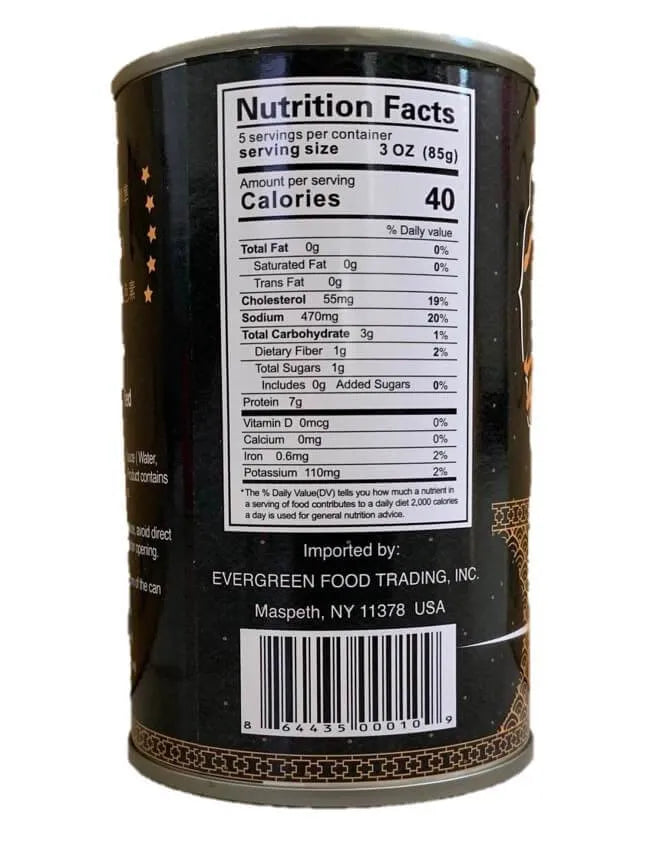Your trusted source for simple, practical nutrition advice and tips for a healthier lifestyle.
Abalone is rich in protein, vitamins, and minerals. It supports immune health and improves skin condition.
Abalone Nutritional Benefits: Abalone, a marine mollusk, offers numerous nutritional benefits. Packed with high-quality protein, it aids muscle growth and repair. It contains essential vitamins like B12, aiding in energy production. Abalone is also a great source of minerals, including magnesium and selenium, which support various bodily functions.
Its omega-3 fatty acids promote heart health and reduce inflammation. Regular consumption can improve skin condition due to its collagen content. Low in fat and calories, abalone suits weight management diets. This delicacy not only delights the palate but also contributes significantly to overall well-being.
Introduction To Abalone
Abalone is a type of shellfish enjoyed worldwide for its taste and health benefits. This sea snail is not just a delicacy but also a nutritional powerhouse.
What Is Abalone?
Abalone is a marine mollusk with a single shell and a soft body. It belongs to the Haliotidae family. The shell has a beautiful, iridescent interior that is often used in jewelry.
People enjoy abalone in various dishes, from sushi to stir-fries. Its tender, meaty texture and unique flavor make it a favorite among seafood lovers.
Historical Significance
Abalone has been a part of human diets for thousands of years. Ancient coastal communities gathered it for food and trade. In some cultures, abalone shells were used as currency.
In traditional Chinese medicine, abalone is valued for its supposed healing properties. It is believed to improve eyesight, strengthen the immune system, and provide various other health benefits.
Today, abalone remains popular in many cuisines, especially in Asian countries like Japan, China, and Korea.
| Nutrient | Amount per 100g |
|---|---|
| Protein | 17g |
| Iron | 2.1mg |
| Vitamin B12 | 0.98µg |
| Omega-3 Fatty Acids | 200mg |
Abalone is low in fat and high in protein, making it a nutritious option for a healthy diet.

Credit: www.checkyourfood.com
Nutritional Profile
Abalone is a type of shellfish that is popular in many cuisines. It is not just tasty but also packed with nutrients. Let’s explore its nutritional profile to understand why it is so beneficial.
Vitamins And Minerals
Abalone is rich in various vitamins and minerals. This makes it a healthy choice. Here are some of the key vitamins and minerals found in abalone:
- Vitamin A: Important for vision and skin health.
- Vitamin B12: Helps keep your nerve and blood cells healthy.
- Iron: Essential for making hemoglobin in your blood.
- Calcium: Important for strong bones and teeth.
- Magnesium: Helps with muscle and nerve function.
These nutrients help your body in many ways. Eating abalone can boost your overall health.
Protein Content
Abalone is an excellent source of protein. Protein is crucial for building and repairing tissues. Here is a breakdown of its protein content:
| Nutrient | Amount per 100g |
|---|---|
| Protein | 17.1g |
With 17.1 grams of protein per 100 grams, abalone helps meet your daily protein needs. Protein is essential for muscle growth and repair.
Health Benefits
Abalone is a nutrient-dense seafood. It offers numerous health benefits. This section explores its advantages. Learn how abalone can boost your health.
Boosts Immune System
Abalone is rich in vitamins and minerals. It contains a high amount of Vitamin C. Vitamin C strengthens the immune system. It helps the body fight off infections.
It also has zinc. Zinc is essential for immune function. It supports the production of immune cells. These cells protect the body from pathogens.
Here is a table showing the immune-boosting nutrients in abalone:
| Nutrient | Amount per 100g | Benefit |
|---|---|---|
| Vitamin C | 3 mg | Boosts immune response |
| Zinc | 1.8 mg | Supports immune cell production |
Supports Heart Health
Abalone contains omega-3 fatty acids. These acids are crucial for heart health. They help reduce inflammation in the body. Inflammation can lead to heart disease.
It is also low in saturated fat. High saturated fat can harm the heart. Abalone provides a healthy alternative. It promotes better heart function.
Here are some heart health benefits of abalone:
- Reduces bad cholesterol levels
- Improves blood circulation
- Maintains healthy blood pressure
Incorporating abalone into your diet can protect your heart. Enjoy the delicious taste and health perks.

Credit: ch.pinterest.com
Antioxidant Properties
Abalone is a treasure trove of health benefits. One of its major advantages is its antioxidant properties. These properties help protect the body from harmful substances known as free radicals. Eating abalone can significantly boost your overall health.
Fighting Free Radicals
Free radicals are unstable molecules that damage cells. Abalone contains antioxidants that neutralize these harmful molecules. This helps prevent cell damage and promotes better health.
- Rich in Vitamin E
- Contains Selenium
- Includes Zinc
These nutrients work together to fight free radicals effectively. Regular consumption of abalone can help maintain cellular health.
Anti-inflammatory Effects
Inflammation is a common cause of many diseases. Abalone’s antioxidants help reduce inflammation in the body. This can lead to better joint health and reduced pain.
Key anti-inflammatory nutrients in abalone include:
- Omega-3 fatty acids
- Vitamin C
Omega-3 fatty acids are known for their anti-inflammatory effects. Vitamin C boosts the immune system and reduces inflammation.
Incorporating abalone into your diet can offer substantial health benefits. Its antioxidant properties are powerful allies in fighting free radicals and reducing inflammation.
Weight Management
Abalone is a fantastic seafood choice for those focused on weight management. This marine delicacy offers numerous health benefits, aiding in maintaining a healthy weight. Let’s dive into the specifics of how abalone supports weight management.
Low In Calories
Abalone is naturally low in calories. A 3-ounce serving of abalone contains approximately 95 calories. This makes it an excellent choice for those who want to reduce their calorie intake.
Here is a comparison of calorie content per 3-ounce serving:
| Food Item | Calories |
|---|---|
| Abalone | 95 |
| Chicken Breast | 140 |
| Beef Steak | 210 |
Choosing low-calorie foods like abalone helps in creating a calorie deficit. This is essential for weight loss and management.
High In Protein
Abalone is also rich in protein. A 3-ounce serving provides around 17 grams of protein. Protein is crucial for muscle maintenance and growth. It also keeps you full longer, reducing the urge to snack.
Benefits of high protein intake include:
- Muscle repair and growth
- Increased satiety
- Boosted metabolism
Including abalone in your diet ensures you get a good amount of protein without excess calories. This balance supports effective weight management.
Bone Health
Abalone is a nutrient-rich seafood that offers various health benefits. One significant advantage is its positive impact on bone health. This section will explore how abalone contributes to stronger bones and the prevention of osteoporosis.
Calcium And Magnesium
Abalone is packed with essential minerals like calcium and magnesium. These minerals are crucial for maintaining strong bones. Calcium helps in building and maintaining bone structure. Magnesium supports calcium absorption, ensuring it gets to the bones.
Here is a simple table showing the mineral content in abalone:
| Mineral | Amount per 100g |
|---|---|
| Calcium | 20 mg |
| Magnesium | 30 mg |
Including abalone in your diet can help meet daily calcium and magnesium needs. These minerals work together to enhance bone density and strength.
Preventing Osteoporosis
Osteoporosis is a condition where bones become weak and brittle. It often affects older adults, especially women. Abalone’s rich mineral content helps prevent osteoporosis.
Here are a few ways abalone helps in preventing osteoporosis:
- Boosts bone density with calcium
- Supports bone health with magnesium
- Reduces bone loss
Regular consumption of abalone can be a tasty way to maintain healthy bones. This can lower the risk of fractures and bone-related issues.
Skin And Hair Benefits
Abalone is not just a delicious seafood. It also offers significant skin and hair benefits. This marine delicacy is packed with essential nutrients. These nutrients can help enhance your skin and hair health. Let’s explore how abalone can benefit your skin and hair.
Collagen Production
Abalone is rich in collagen-boosting nutrients like protein and vitamins. Collagen is crucial for skin elasticity and firmness. It helps in reducing wrinkles and fine lines.
Vitamin C in abalone enhances collagen synthesis. This keeps your skin youthful and radiant. Abalone also contains essential amino acids. These amino acids support the body’s collagen production.
| Nutrient | Benefit |
|---|---|
| Protein | Supports collagen production |
| Vitamin C | Boosts collagen synthesis |
| Amino Acids | Enhances skin elasticity |
Promoting Hair Growth
Abalone is a powerhouse of minerals like zinc and iron. These minerals are vital for hair growth. Zinc helps in repairing damaged hair tissues. Iron improves blood circulation to the scalp. This promotes healthier hair follicles.
Abalone also contains omega-3 fatty acids. These fatty acids nourish the scalp. They also prevent hair dryness and breakage.
- Zinc: Repairs hair tissues
- Iron: Enhances blood circulation to the scalp
- Omega-3 Fatty Acids: Nourishes the scalp
Incorporating abalone into your diet can lead to stronger, shinier hair. A consistent intake will show visible improvements.
Culinary Uses
Abalone is a delicious and versatile seafood. Its unique texture and flavor make it a favorite in many cuisines. This section explores popular recipes and cooking tips for abalone.
Popular Recipes
- Grilled Abalone: Marinate abalone slices in soy sauce and garlic. Grill for 2-3 minutes each side.
- Abalone Sashimi: Thinly slice raw abalone. Serve with soy sauce and wasabi.
- Abalone Chowder: Combine abalone, potatoes, and corn in a creamy soup base.
- Abalone Stir-Fry: Stir-fry abalone with vegetables and oyster sauce.
- Abalone Pasta: Toss cooked pasta with abalone, olive oil, and garlic.
Cooking Tips
Here are some tips to make your abalone dishes delicious:
- Tenderize the Abalone: Use a meat mallet to tenderize.
- Do Not Overcook: Overcooking makes abalone tough. Cook briefly.
- Marinate for Flavor: Marinate abalone for at least 30 minutes.
- Use Fresh Ingredients: Fresh herbs and spices enhance flavor.
- Serve Immediately: Serve abalone dishes fresh for best taste.
Abalone offers diverse culinary possibilities. Enjoy experimenting with this nutritious seafood in your kitchen!
Sustainability And Sourcing
Abalone is a prized seafood known for its rich flavor and nutritional benefits. Ensuring sustainable sourcing is crucial for maintaining abalone populations. This section will explore the importance of sustainability and provide tips on sourcing quality abalone.
Eco-friendly Practices
Sustainable abalone farming uses eco-friendly practices. These practices protect marine ecosystems and ensure long-term viability. Here are some key methods:
- Controlled Breeding: Farms control breeding to prevent overharvesting.
- Water Quality Management: Regular checks ensure clean and healthy water.
- Minimal Impact: Farms minimize their impact on local wildlife.
- Waste Reduction: Efficient systems reduce waste and pollution.
These practices help keep the ocean healthy. They ensure abalone populations remain strong.
Choosing Quality Abalone
Choosing quality abalone ensures you get the best taste and nutrition. Here are some tips for selecting top-quality abalone:
- Check the Source: Buy from reputable farms or suppliers.
- Look for Certifications: Choose abalone with eco-friendly certifications.
- Inspect the Appearance: Fresh abalone should look vibrant and moist.
- Smell Test: Fresh abalone should have a clean, ocean-like smell.
By following these tips, you can enjoy delicious and nutritious abalone while supporting sustainable practices.

Credit: www.newgreenusa.com
Frequently Asked Questions
Is It Healthy To Eat Abalone?
Yes, eating abalone is healthy. It is high in protein, low in fat, and rich in essential nutrients.
Is Abalone A Superfood?
Yes, abalone is considered a superfood. It is rich in protein, omega-3 fatty acids, and essential vitamins.
What Is So Special About Abalone?
Abalone is special due to its iridescent shell and rich, savory taste. It’s a prized delicacy in many cuisines.
Is Abalone Good For Liver Health?
Yes, abalone is beneficial for liver health. It contains antioxidants and nutrients that support liver function and detoxification.
Conclusion
Abalone offers a treasure trove of nutritional benefits. Rich in protein, vitamins, and minerals, it supports overall health. Its omega-3 fatty acids promote heart and brain function. Including abalone in your diet can enhance well-being. Enjoy this delicious seafood to reap its numerous health advantages.





